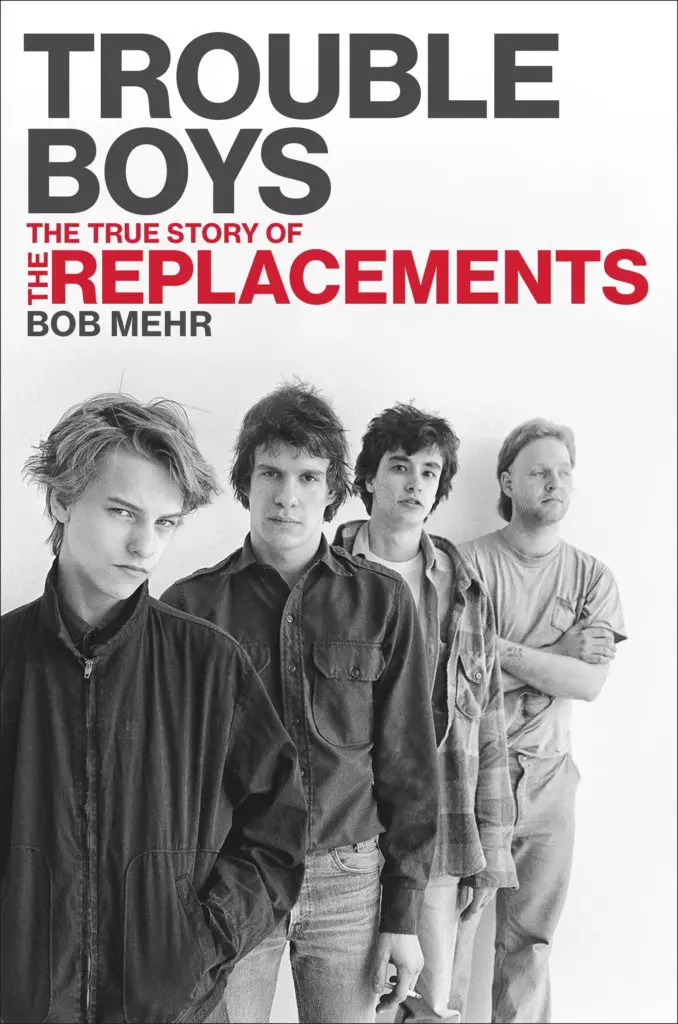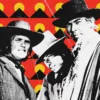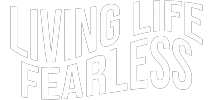How do you build a name for yourself (and your band) by trying your best not to succeed? If you have any doubts, you just may try and ask Paul Westerberg, the force who lead The Replacements, one of the best and most creative bands of the ’80s American indie rock scene.
It seems that both Westerberg and his then bandmates were trying to live and play their music by the motto, “dysfunctionality equals authenticity.” The group was known for their chaotic and unpredictable live performances, which often resulted in them being booed off the stage.

Despite this, or perhaps because of it, The Replacements built a devoted following among music fans who appreciated their raw talent and DIY attitude. As Rolling Stone notes, “[t]hey were the scream of a generation that didn’t even know why it felt like screaming – attacking the status quo with equal parts drunken abandon and divine inspiration.”
Known for their chaotic and unpredictable live performances
No wonder Trouble Boys, Bob Mehr’s book about the band, bore such a title, and in the tradition the band operated, the planned film based on the book never came about.
Westerberg has continued his career as a solo artist after The Replacements disbanded in 1991, and he has remained true to his iconoclastic spirit. For example, in 2005, he released an album called Come Feel Me Tremble, which consisted of 31 tracks that were recorded in just six days.
He has also collaborated with a number of other musicians over the years, including The Pretenders’ Chrissie Hynde and quite a few others.
Give up on your dreams, they’ll only disappoint you anyway.
When did it all start? Actually, while Westerberg was working as a janitor at a Minneapolis printing plant. He started writing songs and playing them at local clubs with his friends Tommy Stinson (bass) and Chris Mars (drums). The Replacements were born.
The band’s first album, Sorry Ma, Forgot to Take Out the Trash, was released in 1981 when Westerberg was just 21 years old. It was a raw and unpolished record that perfectly captured The Replacements’ DIY punk aesthetic. The album’s standout tracks included the anthemic “I’m in Trouble” and the raucous “Kick Your Door Down.”
Despite its lo-fi production values, Sorry Ma was an instant underground classic, cementing The Replacements’ reputation.
Talking about the band’s beginnings, Westerberg told an interviewer: “They didn’t even know what punk was. They didn’t like punk. Chris had hair down to his shoulders.”
Peter Jasperson, the co-founder of Minneapolis’ Twin/Tone Records, was enamored with the band, pleading with the label to release their song “Kids Don’t Follow,” even if he had to print the jacket himself. As the story goes, the partners agreed to fund the recording, but Jesperson and virtually everyone he knew had to hand-stamp ten thousand white record jackets.
The Replacements finally had their record (Stink, 1982), and though it didn’t sell well, the group’s live shows were becoming the stuff of legend. The band’s wild onstage antics and willingness to play any gig offered – no matter how sleazy the venue – quickly gained them a devoted following among Minneapolis music fans.
Let go of the past, it’s not worth holding onto
The Replacements began to distance themselves from the hardcore punk scene after the release of Stink. “We write songs rather than riffs with statements,” said Westerberg later on.
Many fans wondered how their follow-up, Hootenanny got its name. It turns out that Stark, one of the co-owners of Twin/Tone who recorded the album had a meticulous approach to recording, widely contrasting the band’s haphazard approach at the time, something that was quite frustrating for Westerberg and co.
In one session, Mars and Westerberg switched instruments, and the band began to improvise, with Westerberg repeatedly shouting, “It’s a hootenanny.” The band then declared it to be “side one, track one” of the new album. The Replacements would often play songs live before they had time to learn them properly, which gave their concerts a sense of spontaneity. Hootenanny was The Replacements’ most successful album, selling over 200,000 copies.
The Replacements would often play songs live before they had time to learn them properly
While The Replacements were on tour to promote Hootenanny, Bob Stinson was kicked out of the band due to his increasing alcoholism. His replacement was Slim Dunlap, who had been The Replacements’ soundman and occasional guitar player since 1981. The tour ended with The Replacements playing at Max’s Kansas City in New York with The Ramones.
By the following year, and their fourth album, Let It Be, Westerberg and The Replacements were further letting go of the past. The album, which featured the Westerberg-penned anthems “I Will Dare” and “Unsatisfied,” established The Replacements as one of the most exciting punk indie bands around, with the punk tag slowly dropping into the background and Westerberg and the band finding inspiration elsewhere, from heavy metal and blues to power pop.
Don’t be afraid to alienate people with your choices
Tim, the album that followed in 1985 was The Replacement’s first release for a major label (Sire). The change in labels brought with it a more polished sound, but The Replacements were still The Replacements. The songs were as raw and personal as anything Westerberg had written before, and the album included one of The Replacement’s most enduring songs, “Bastards of Young.”
And then came Pleased to Meet Me. It was an album that was met with absolute acclaim and is now considered one of the rock music masterpieces. Westerberg was the dominant figure on the album, with his singing, guitar playing, and primarily, his ever-expanding songwriting.
As far as the acclaim goes, the last two albums under The Replacement tag, Don’t Tell A Soul (1989) and All Shook Down (1990) didn’t fare so well, as far as critical acclaim was concerned, at least at the time. The band was falling apart, and it was practically all Westerberg under The Replacement tag.
It was thought at the time that the two albums were good, but they lacked the power of the earlier records. As time passed by, there was a complete re-assessment of their quality, and now they are considered to stand proud in Westerberg’s and The Replacement’s canon. The Replacements disbanded soon after All Shook Down.
Embrace your darkness, it’s a part of who you are
Westerberg’s first solo album, 14 Songs, was released in 1993. The album was a direct result of the break-up of The Replacements. It possibly stands at the top of Westerberg’s solo work and seems to be one of everybody’s favorites. The songs are classic Westerberg and they show his true genius as a songwriter. The album is dark, introspective, and at times, very personal.
After 14 Songs, Westerberg released Eventually in 1996 and Suicaine Gratifaction in 1999. These two albums were not as well-received as his debut solo album, but they, as ever, included great songs, that like with all Westerberg material, simply stick, both musically and lyrically.
Westerberg quit the major-label circuit for three years before staging a comeback in 2002. The two albums, Mono and Stereo (under his alter ego Grandpaboy) were released on Vagrant Records and received critical acclaim. The albums are both full of great songs, but Westerberg’s fans had to search a little harder to find them, as the albums were not as readily available in stores. These albums were followed by another three-year break and then Westerberg returned with Come Feel Me Tremble, which was again met with positive reviews, though not to the extent of Mono.
In 2005, Westerberg released two EPs, Open Season and Folker. The former EP included the song “Help Me Rhonda” which is one of Westerberg’s best-known solo songs. The song is classic Westerberg .
In December 2005, Westerberg reconvened with Tommy Stinson and Chris Mars to record two new songs for the Replacements’ compilation titled “Don’t You Know Who I Think I Was?” which was released in 2006.
Westerberg abides by the motto create something beautiful from the ruins
As AllMusic notes, in 2013, The Replacements were booked as headliners at the Riot Fest music festivals being held in August and September in Toronto, Chicago, and Denver, with Westerberg and Stinson, joined by guitarist Dave Minehan and drummer Josh Freese. The Riot Fest appearances were well received by critics and fans, and it led to a run of festival appearances and occasional stand-alone dates. While the band posted a 24-minute jazz-influenced instrumental called “Poke Me in My Cage” on SoundCloud and performed a new song, “Whole Food Blues,” on-stage, plans for a reunion album were scrapped when Westerberg and Stinson were unhappy with the initial sessions.
From there on, Westerberg concentrated on recording soundtracks and often presented his solo work only through his online site. In late 2015, Westerberg announced that he had formed a new band called The I Don’t Cares with Juliana Hatfield, Their debut album, Wild Stab, was released in January 2016.
While he is not in focus these days, it seems that now, as he did throughout his whole solo career, Westerberg abides by the motto create something beautiful from the ruins. That self-destruction never really comes about.





